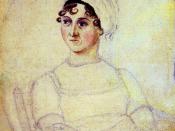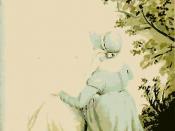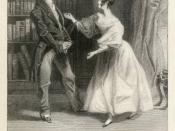This episode is only two chapters from the end of the story; Mr Darcy is asking Mr Bennet for his daughterÃÂs hand in marriage. At this stage the reader will be harbouring very different emotions towards the characters than they would have done only a few chapters earlier. The extended and convoluted growth of Elizabeth and DarcyÃÂs relationship has finally come to fruition and this must result in a feeling of satisfaction and excitement from the reader. The narrator, who first introduced himself with the universal truth that ÃÂa single man in possession of a good fortune, must be in want of a wifeÃÂ, has just confirmed that truth within the telling of the story. The placement of this passage within the novel as a whole is extremely relevant when discussing the narrative voice and dialogue used within it; are AustenÃÂs narrative practices comparative to those used throughout the book, or are there some differences to be identified?The narrator of Pride and Prejudice is omniscient and in the third person, meaning that it can see directly into the charactersÃÂ playersÃÂ thoughts and interpret them as it will.
However the narratorÃÂs reliability is often called into question and sometimes it appears to be teasing the reader as much as the women within the book tease the men around them. In the opening paragraph of this passage Austen uses free indirect speech to help convey ElizabethÃÂs anxiety over what is about to happen, and also to make the reader feel a certain level of tension and excitement themselves.
ÃÂShe did not fear her fatherÃÂs opposition, but he was going to be made unhappy, and that it should be through her means, that she, his favourite child, should be distressing him by her choice, should be filling him with fears and regrets..ÃÂ (p288)The...


